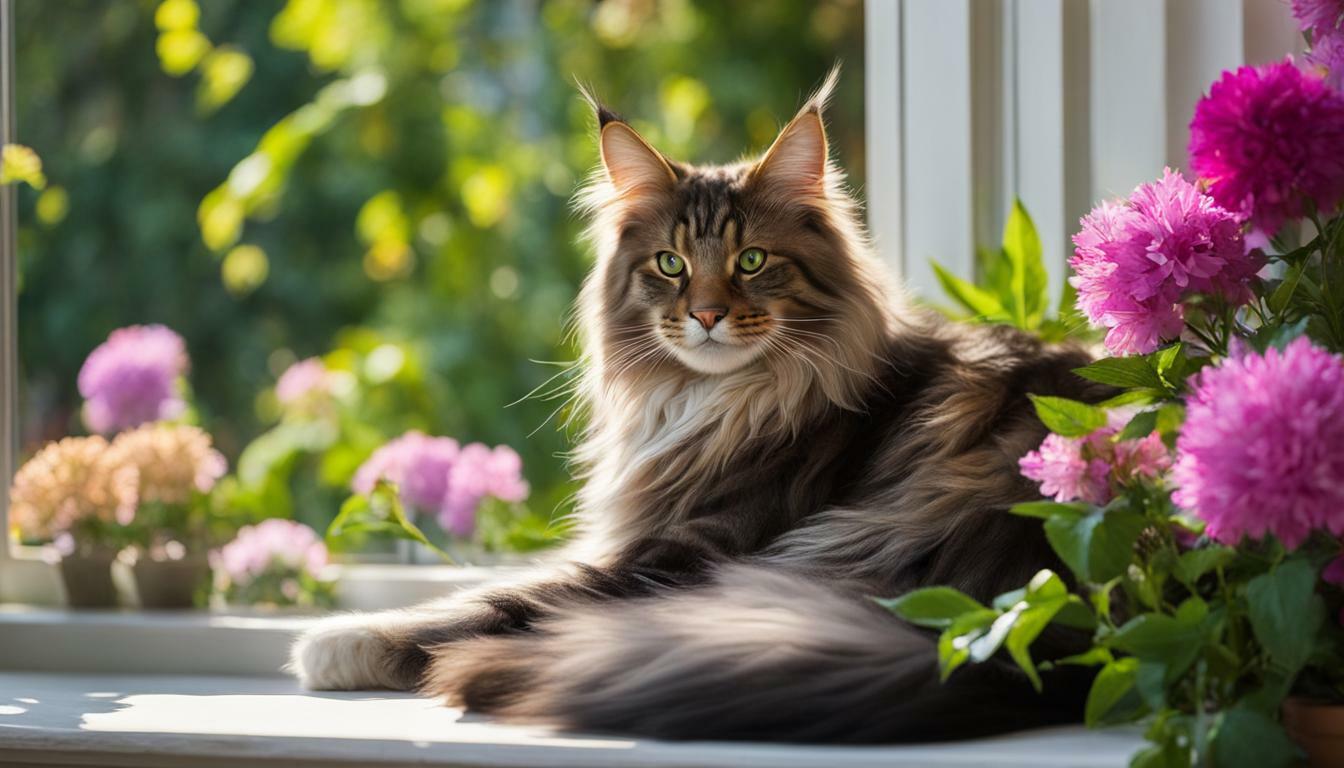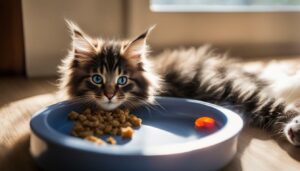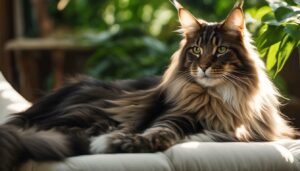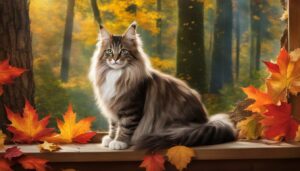Welcome to the world of the Maine Coon, one of the largest and most lovable cat breeds! Originating in Maine, United States, the Maine Coon is known for its impressive size and dense coat of fur that helps it thrive in harsh climates. With their gentle and friendly nature, Maine Coons have earned the nickname “the gentle giant” and are often compared to dogs in terms of their loyalty and intelligence. Let’s explore the fascinating world of this magnificent breed.
Key Takeaways:
- Maine Coons are one of the largest domesticated cat breeds.
- They originate from Maine, United States.
- Maine Coons have a dense coat of fur that aids in their survival in harsh climates.
- They are known for their gentle and friendly nature, often referred to as “the gentle giant.”
- Maine Coons are loyal, intelligent, and playful, making them great companions.
Origins and History of the Maine Coon
Let’s explore the fascinating origins and history of the Maine Coon, a breed with distinctive characteristics and a rich popularity. The Maine Coon is a large domesticated cat breed that originated in Maine, United States. Known for its size and dense coat of fur, the Maine Coon developed to survive harsh climates. Often referred to as “the gentle giant,” this breed exhibits “dog-like” characteristics, making it a favorite among cat enthusiasts.
Despite the myths surrounding its origins, scientific studies have shown that the Maine Coon belongs to the Western European monophyletic cat branch and is genetically closest to cats found in the United Kingdom. While claims of hybridization with raccoons or Viking ship’s cats may add to the breed’s allure, their true lineage lies within Western Europe.
During the early years, Maine Coons enjoyed popularity in cat shows. However, their reputation waned with the introduction of other long-haired breeds. It was not until the 1960s that they made a remarkable comeback, and today, the Maine Coon is the third most popular cat breed in the United States.
| Maine Coon Cat Characteristics | Maine Coon Cat Size | Popular Cat Breeds |
|---|---|---|
| Gentle and friendly nature | Long, muscular body | Maine Coon |
| Intelligence and playfulness | Large head | Persian |
| Loyal to families and good with other pets and children | Wide-set ears | Siamese |
The Unique Appearance of Maine Coons
Maine Coons have a distinctive physical appearance that sets them apart from other cat breeds. With their long, muscular bodies, large heads, and wide-set ears, they have a commanding presence. However, it is their long, thick, and water-repellent coats that truly capture attention. Regular grooming is essential for maintaining their luxurious fur and preventing matting.
Due to their friendly nature and intelligence, Maine Coons make excellent companions. They are known to be loyal to their families and get along well with other pets and children. However, they are not typically lap cats; instead, they prefer to be close by, joining in the family’s activities.
To ensure the well-being of Maine Coons, it is important to be aware of potential health issues they may face, such as feline hypertrophic cardiomyopathy, hip dysplasia, and polycystic kidney disease. Regular veterinary check-ups and preventive care are necessary to keep them healthy and happy. Additionally, their large size calls for wide food and water bowls, as well as ample space for them to roam and play.
In conclusion, the Maine Coon is a truly remarkable breed with a captivating history and unique characteristics. Their popularity has stood the test of time, making them a beloved choice among cat lovers. If you seek a friendly, intelligent, and visually stunning companion, the Maine Coon might just be the perfect addition to your family.
Maine Coon Cat Care and Personality
Discover the unique care needs and lovable personality traits of Maine Coon cats, and learn about the availability of these adorable kittens.
Maintaining the well-being of a Maine Coon cat requires some special attention. Due to their long, thick fur, regular grooming is essential to prevent matting and keep their coat looking its best. Brushing their fur a few times a week helps to remove loose hair and prevent tangles. Additionally, Maine Coons have tufted ears, which should be checked regularly for dirt or signs of infection. Keeping their ears clean ensures their overall health and comfort.
Maine Coon cats are known for their friendly and sociable nature. They enjoy the company of their human family members and get along well with other pets and children. However, it’s important to provide them with ample playtime and mental stimulation to keep them happy and content. Their intelligence and curious nature make interactive toys and puzzle feeders a great choice to engage their minds. These playful and affectionate cats will quickly become a beloved member of your family.
Availability of Maine Coon Kittens
If you’re looking to add a Maine Coon kitten to your family, it’s important to find a reputable breeder. Maine Coon kittens are in high demand due to their unique characteristics and friendly nature. However, be prepared for a potentially long waitlist, as the breeders often have limited litters available. It’s advisable to do thorough research and ask for recommendations to ensure you find a breeder who prioritizes the health and well-being of their kittens.
“Maine Coon cats are known for their gentle and friendly nature, intelligence, and playfulness.”
Once you bring your Maine Coon kitten home, be prepared to give them the love and care they deserve. Provide them with a nutritious diet that includes high-quality food rich in animal protein. As Maine Coons are a large breed, ensure their food and water bowls are spacious enough to accommodate their size. Regular veterinary check-ups, vaccinations, and preventive care are vital to keep them healthy and happy throughout their lives.
| Health Concerns | Maintenance Tips |
|---|---|
| Feline hypertrophic cardiomyopathy | Regular veterinary check-ups |
| Hip dysplasia | Provide a diet rich in animal protein |
| Polycystic kidney disease | Maintain regular grooming to prevent matting |
| Keep ears and eyes clean and infection-free |
In conclusion, Maine Coon cats make wonderful companions due to their friendly nature, intelligence, and playful personality. By providing them with proper care, such as regular grooming, mental stimulation, and a nutritious diet, you can ensure they thrive and remain happy and healthy. While Maine Coon kittens may require some patience to find, their unique characteristics and lovable demeanor make them a truly exceptional addition to any family.
Health and Maintenance of Maine Coons
Ensure the well-being of your Maine Coon cat by understanding their common health issues and learning how to properly maintain their coat, ears, and eyes. Maine Coons, known for their large size and dense fur, require regular grooming to keep their beautiful coat in top condition. Their long, thick fur is prone to matting, so it’s important to brush them at least once a week. This not only helps to remove loose hair and prevent tangles but also stimulates blood circulation and promotes a healthy coat.
In addition to grooming, it’s crucial to pay attention to the health of your Maine Coon’s ears and eyes. Maine Coons are prone to ear infections, so it’s important to regularly clean their ears and check for any signs of redness, discharge, or foul odor. You can use a veterinarian-recommended ear cleaning solution and a cotton ball to gently clean the inner parts of the ear, being careful not to insert anything too far into the ear canal.
When it comes to their eyes, Maine Coons may be susceptible to certain eye conditions, such as conjunctivitis or cherry eye. Keep an eye out for any redness, discharge, cloudiness, or changes in your cat’s behavior, as these may indicate an eye problem. If you notice any abnormalities, it’s best to consult with your veterinarian for proper diagnosis and treatment.
| Common Health Issues of Maine Coons | Prevention and Care |
|---|---|
| Feline hypertrophic cardiomyopathy | Regular veterinary check-ups, genetic testing, and a heart-healthy diet |
| Hip dysplasia | Proper nutrition, exercise, and regular monitoring of hip joints |
| Polycystic kidney disease | Genetic testing, regular kidney function tests, and a kidney-friendly diet |
It’s essential to be aware of the common health issues that Maine Coons may face. Regular veterinary check-ups, preventive care, and early detection of any potential problems are key to ensuring their well-being. In addition to their unique health needs, Maine Coons require a well-balanced diet rich in animal protein to support their growth and maintain their overall health. Providing them with wide food and water bowls can accommodate their larger size comfortably.
Maine Coons thrive in homes that offer them ample space to roam and play. They are active cats that enjoy climbing, so providing them with a tall cat tree or various perches can satisfy their natural instincts. Engaging them in interactive play sessions, using toys that simulate hunting and chasing, can also help keep them mentally and physically stimulated. These friendly and intelligent cats make great companions for families looking for a loyal and loving pet.
Living with a Maine Coon
Find out how to create the perfect home environment for your Maine Coon, a friendly and affectionate companion that thrives in a spacious and loving home. Maine Coons are known for their large size and playful nature, so providing them with ample space to roam and explore is essential. Consider investing in a tall cat tree or scratching post to satisfy their natural instinct to climb and perch in high places.
Additionally, Maine Coons are social cats and enjoy the company of their human family members. Make sure to spend quality time with your Maine Coon, engaging in interactive play and providing plenty of affection. They are also known to get along well with other pets, so introducing them to other feline or canine companions can enrich their lives. Just make sure to properly introduce and supervise their interactions.
Creating a Comfortable Living Environment
Maine Coons have a thick, water-repellent coat that requires regular grooming to prevent matting. Set up a comfortable grooming routine and provide a variety of grooming tools, such as a slicker brush and a wide-toothed comb, to keep their coat looking its best. Regularly check their ears and eyes for any signs of infection and clean them as needed.
When it comes to feeding, Maine Coons have big appetites to match their size. Opt for a high-quality cat food that is rich in animal protein and meets their nutritional needs. Provide wide food and water bowls to accommodate their large heads and prevent spillage. Don’t forget to provide fresh water at all times and monitor their weight to prevent obesity.
Lastly, create a safe and stimulating environment for your Maine Coon. Remove any potential hazards and ensure they have access to toys, scratching posts, and hiding spots. Maine Coons are intelligent cats and love to solve puzzles, so consider incorporating puzzle toys or treat-dispensing toys for mental stimulation.
| Living with a Maine Coon: Tips at a Glance |
|---|
| Provide ample space for roaming and climbing, such as a tall cat tree or scratching post. |
| Dedicate quality time for play and affection. |
| Introduce them to other pets gradually and supervise interactions. |
| Establish a regular grooming routine and provide the necessary tools. |
| Feed them a high-quality diet rich in animal protein. |
| Monitor their weight and provide wide food and water bowls. |
| Keep their living environment safe and stimulating with toys and hiding spots. |
Conclusion
In conclusion, the Maine Coon’s unique size, personality, and beauty make it a captivating and cherished companion for cat lovers around the world. This large and fluffy cat breed, known as the “gentle giant,” has a fascinating history rooted in the state of Maine, United States. While myths suggest various origins, scientific research has identified the Maine Coon as belonging to the Western European cat branch, most closely related to cats found in the United Kingdom.
Maine Coons have a long and muscular body, accompanied by a large head and wide-set ears, giving them a distinct appearance that is difficult to resist. Their dense and water-repellent coat requires regular grooming to ensure its health and prevent matting. However, it is their friendly and gentle nature, as well as their intelligence and playfulness, that truly sets them apart.
These feline companions are loyal members of their families and have a remarkable ability to get along well with other pets and children. Although they may not be typical lap cats, Maine Coons provide endless love and companionship. It is essential to prioritize their health by scheduling regular check-ups with a veterinarian and providing preventive care to address potential health concerns such as feline hypertrophic cardiomyopathy, hip dysplasia, and polycystic kidney disease.
For optimal well-being, Maine Coons require a balanced diet rich in animal protein and the provision of wide food and water bowls to accommodate their large size. They thrive in homes with ample space to roam freely and engage in play. Fulfilling their natural instincts is essential, and providing a tall cat tree for climbing and exploring will keep them entertained and content.
With their extraordinary size, affectionate personality, and striking beauty, Maine Coons have rightfully earned their place as one of the most popular cat breeds. They offer a truly unique and delightful companionship experience for those seeking a friendly and intelligent feline companion.
FAQ
Q: Are Maine Coons really as big as they are described?
A: Yes, Maine Coons are one of the largest domesticated cat breeds, with males weighing between 13 to 18 pounds and females weighing between 8 to 12 pounds.
Q: Do Maine Coons require a lot of grooming?
A: Maine Coons have a long, thick coat that requires regular grooming to prevent matting. They should be brushed at least once a week and may need more frequent grooming during shedding seasons.
Q: Are Maine Coons good with children and other pets?
A: Yes, Maine Coons are known for their friendly and gentle nature, and they generally get along well with children and other pets. They make great companions for families.
Q: What health problems are Maine Coons prone to?
A: Maine Coons are prone to certain health issues, including feline hypertrophic cardiomyopathy, hip dysplasia, and polycystic kidney disease. Regular veterinary check-ups and preventive care are important for their well-being.
Q: What is the ideal living environment for a Maine Coon?
A: Maine Coons thrive in homes that provide ample space for them to roam and engage in play. They benefit from having a tall cat tree for climbing and exploring. A home with a large, secure outdoor area is also beneficial.



